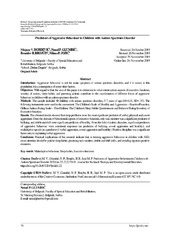Приказ основних података о документу
Predictors of aggressive behavior in children with autism spectrum disorder
| dc.creator | Đorđević, Mirjana | |
| dc.creator | Glumbić, Nenad | |
| dc.creator | Brojčin, Branislav | |
| dc.creator | Jojić, Milena | |
| dc.date.accessioned | 2021-06-17T14:07:29Z | |
| dc.date.available | 2021-06-17T14:07:29Z | |
| dc.date.issued | 2019 | |
| dc.identifier.issn | 2589-7799 | |
| dc.identifier.uri | http://rfasper.fasper.bg.ac.rs/handle/123456789/3271 | |
| dc.description.abstract | Introduction: Aggressive behaviour is not the main symptom of autism spectrum disorders, and if it occurs in this population, it is a consequence of some other factors. Objectives: With regard to that, the aim of this paper isto determine to what extent certain aspects of executive functions, severity of autism, sleep habits, and parenting actions contribute to the manifestation of different forms of aggressive behaviourin children with an autism spectrum disorder. Methods: The sample included 40 children with autism spectrum disorders, 5-7 years of age (M=6.18, SD= .55). The following instruments were used in the assessment: The Children's Scale of Hostility andAggression –Reactive/Proactive, Gilliam Autism Rating Scale –Third Edition, The Children's Sleep Habits Questionnaire andBehaviorRating Inventory of Executive Function. Results: The obtained results showed that sleep problems were the most significant predictor of verbal, physical and covert aggression. From the domain of behavioural aspects of executive functions, only task monitor was a significant predictor of bullying, and inhibit and shift were significant predictors of hostility. From the field of autistic disorders, significant predictors of aggressive behaviour were emotional responses (as predictors of bullying, covert aggression and hostility), and maladaptive speech (as a predictor of verbal aggression, covert aggression and hostility). Punitive discipline was a significant factor only in explaining verbal aggression. Conclusion: Practical implications of this research indicate that, in treating aggressive behaviour in children with ASD, more attention should be paid to sleep habits, practising task monitor, inhibit and shift skills, and avoiding rigorous punitive measures. | |
| dc.publisher | ReAttach Therapy International Foundation, Frederik Hendrikstraat 13, 5583 CL Waalre, The Netherlands | |
| dc.relation | info:eu-repo/grantAgreement/MESTD/Basic Research (BR or ON)/179017/RS// | |
| dc.rights | openAccess | |
| dc.rights.uri | https://creativecommons.org/licenses/by-nc/4.0/ | |
| dc.source | Journal for ReAttach Therapy and Developmental Diversities | |
| dc.subject | Maladaptive behaviour | |
| dc.subject | Sleep habits | |
| dc.subject | Executive functions | |
| dc.title | Predictors of aggressive behavior in children with autism spectrum disorder | en |
| dc.type | article | |
| dc.type | article | |
| dc.rights.license | BY-NC | |
| dc.citation.epage | 81 | |
| dc.citation.issue | 2 | |
| dc.citation.other | 2(2): 70-81 | |
| dc.citation.rank | M23 | |
| dc.citation.spage | 70 | |
| dc.citation.volume | 2 | |
| dc.identifier.doi | 10.26407/2019jrtdd.1.22 | |
| dc.identifier.fulltext | http://rfasper.fasper.bg.ac.rs/bitstream/id/3197/bitstream_3197.pdf | |
| dc.type.version | publishedVersion |


